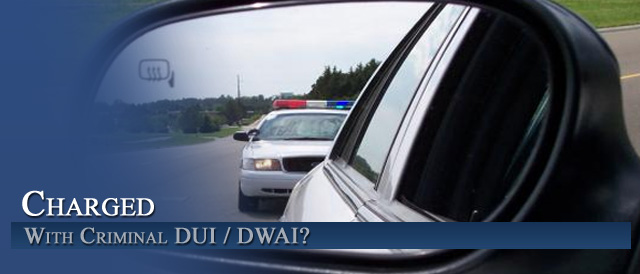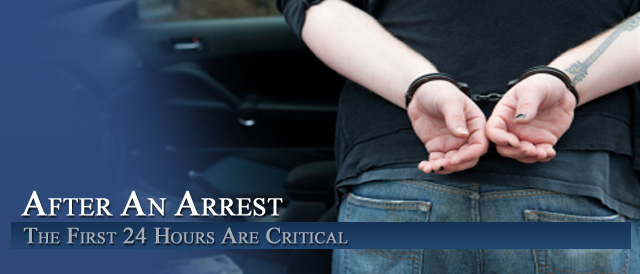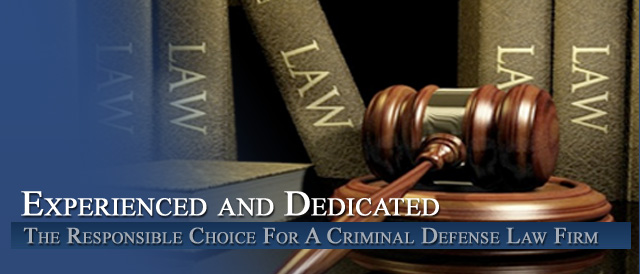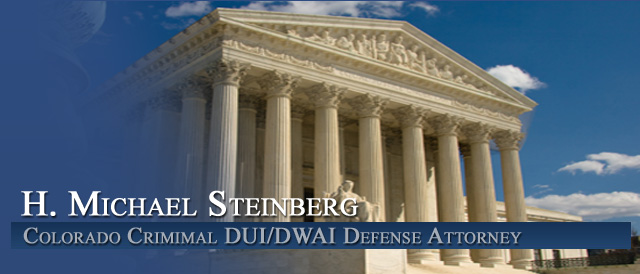




Taking Blood Samples from Colorado Persons Arrested For DUI and Colorado Felonies
by Colorado DUI – DWAI Lawyer – Attorney H. Michael Steinberg
The taking of a blood for a blood alcohol test – voluntarily or by force – is a major issue confronting the Colorado and national courts. This article explores the subject as it applies to DUI and Non- Traffic felony criminal cases.
Blood Tests Are Intrusive and They Are “Searches” Under The Constitution
Blood tests cannot be forced on people “automatically” in criminal cases. Blood tests are considered “searches” within the scope of the Fourth Amendment and require either consent or probable cause to believe that a crime, whose elements include being under the influence of alcohol/controlled substances, has been committed.
Blood Tests In Colorado DUI Traffic Cases
Under the DUI statute, an officer can only request a blood test when the officer has “probable cause” to believe the person was driving a vehicle while impaired by alcohol/drugs.
See CRS Section 42-4-1301 (7)(b)(I) – (below)
So What Is Probable Cause?
Probable cause to suspect the presence of alcohol is usually such things as the odor of alcohol, the presence of beverage containers, red blood shot watery eyes, slurred speech, lack of coordination.
Drug intoxication is harder. Probable cause to suspect the presence of controlled substances requires a different set of evidence. Officers try to build their probable cause by observations of such things as coordination, slurred speech, presence of drug containers, lack of odor of alcohol, admissions, statements of witnesses and the like. Sometimes a Drug Recognition Expert (DRE) is brought in to conduct an “examination.”
Observations of these types of characteristics may give an officer good faith probable cause to compel the taking of a blood sample. Mere admissions to the use of alcohol/controlled substances are not enough. Officers must have some corroboration that the person is under the influence.
A Confession Is NOT ENOUGH
In People v. Reynolds, 895 P.2d 1059 (Colo.19 95), a driver involved in a one- car accident admitted to consuming three beers more than six hours before the accident. The court held that this alone, without evidence of any of the “familiar signs of intoxication,” did not constitute probable cause to involuntarily take a blood sample from the driver.
These probable cause requirements also apply to unconscious/dead suspects also under 42-4-1301 (7) (see below).
The fact that a party is unconscious does not excuse the officer from the requirement of having probable cause to believe that the suspect’s blood contains alcohol or controlled substances. In traffic situations, samples can be obtained from unconscious suspects pursuant to the Express Consent Law.
The Right To Refuse
Under the DUI express consent law, an arrestee has a statutory right to refuse to provide a sample of his/her blood or breath (see 42-4-1301 (7) (a) (11)). But the refusal can then be used in an administrative license revocation hearing to revoke the driver’s license for at least a year with no driving.
A Closer Look at Probable Cause & Blood Draws – People v. Grassi
In People v. Grassi – The Colorado Courts help us to understand the concept of probable cause…
| The probable cause determination rests on all of the facts and circumstances known to the police at the time of the arrest |
“Probable cause to draw blood exists when the facts and circumstances known to the police support the reasonable belief that the defendant committed an alcohol-related offense.”
“The police have probable cause to arrest when the facts and circumstances known to the police are sufficient to warrant the belief by a reasonable and prudent person that the defendant committed an alcohol-related offense.”.
“Probable cause may be based on circumstantial evidence, and the police are entitled to draw appropriate inferences from the circumstantial evidence, even though the evidence might also support other inferences.”
The Facts of People v. Grassi
A jury convicted Mr. Grassi Vehicular Homicide, manslaughter, DUI and DUI – excessive alcohol. He appealed, and the Court of Appeals sent the case back to the trial court to determine whether the police had probable cause to draw blood from the unconscious Mr. Grassi. The trial court held a hearing, and determined that the state patrol did possess enough facts to establish probable cause for the blood draw from Mr. Grassi.
The Issue Was: When do the police have probable cause to draw blood samples?
- Here, the Court claimed more existed than merely an accident and an odor of alcohol. The Court pointed to the following:
- no yaw marks existed indicating Mr. Grassi did not apply the brakes;
- the car went some 200 ft. off of the roadway;
- the car had no damage or problem that caused the accident;
- the road was clear, dry, and nothing existed in the roadway to cause the accident;
- troopers opined that Mr. Grassi’s car traveled along the “fog line” (white line) which, they continued, was indicative of someone driving under the influence;
- Mr. Grassi “still had a strong odor of alcohol three hours after the accident.”
Criminal Code Traffic Cases – Forcible – Involuntary Blood Draws In Colorado
In certain specified DUI cases that involve charges under the Criminal Code, the statutes permit officers to forcibly restrain a driver to obtain a blood test, when the officer has probable cause to believe the person was driving under the influence of alcohol/drugs.
Involuntary blood samples can be obtained in cases involving the following charges:
Criminally Negligent Homicide [18-3-105]
Vehicular Homicide [18-3-106 (1) (b)]
Vehicular Assault [18-3-205 (1)(b)]
Some Key Provisions of The Law:
The Refusal
42-4-1301.1(3) Any person who is required to take and to complete, and to cooperate in the completing of, any test or tests shall cooperate with the person authorized to obtain specimens of such person’s blood, breath, saliva, or urine, including the signing of any release or consent forms required by any person, hospital, clinic, or association authorized to obtain such specimens. If such person does not cooperate with the person, hospital, clinic, or association authorized to obtain such specimens, including the signing of any release or consent forms, such non cooperation shall be considered a refusal to submit to testing.
No Physical Restraint – No Violence – UNLESS One Of These Crimes
No law enforcement officer shall physically restrain any person for the purpose of obtaining a specimen of such person’s blood, breath, saliva, or urine for testing except when the officer has probable cause to believe that the person has committed a violation of:
Section 18-3-105, Criminally Negligent Homicide
Section 18-3-106 (1) (b), Vehicular Homicide
Sections 18-3-204, Third Degree Assault
or
Section 18-3-205(1)(b), C.R.S., Vehicular Assault
AND the person is refusing to take or to complete, or to cooperate in the completing of, any test or tests, then, in such event, the law enforcement officer may require a blood test.
Blood Test Admissible Even If Involuntary
42-4-1301(6)(e) Evidence acquired through such involuntary blood test shall be admissible in any prosecution for a violation of subsection (1) or (2) of this section and for a violation of section 18-3-105, 18-3-106 (1) (b), 18-3-204, or 18-3-205 (1) (b), C.R.S.
Non-Traffic Criminal Cases And Blood Draws
People v. Williams [557 P.2d 399 (1979)] was a case involving a shooting death. Investigating officers had taken blood and urine samples from the suspect, over her objections, shortly after the incident. The tests were conducted because witnesses had seen the suspect in a bar earlier on the day of the shooting and an officer noted a “faint smell of liquor about her” after the shooting. The Colorado Supreme Court suppressed the results of the tests because the officers lacked any “clear indication” that the suspect was intoxicated.
The court said that there was no evidence as to what she drank in the bar, how much she drank, and how long before the shooting. The court held that “the slight liquor smell on her breath may have indicated that alcohol had been consumed, but, by itself, did not clearly indicate intoxication.” Noted by the court was the fact that the officer made no observations of her demeanor that would indicate that she was intoxicated.
A quote from Schmerber was cited by the court: “The Fourth Amendment forbids such intrusions (beneath the body’s surface) on the mere chance that desired evidence may be obtained. In the absence of a clear indication that in fact such evidence will be found, these fundamental human interests require law officers to suffer the risk that such evidence may disappear unless there is an immediate search.”
Taking Blood Samples In Other Colorado Major Blood Draw Felony Cases
In major felonies, two or more blood tests are conducted several hours apart. Schmerber allowed a warrantless blood test only because the alcohol soon disappears from the blood stream.
In non-traffic cases, police will try to compel a blood test to prevent a “built in intoxication defense” that he would not otherwise have had if the officer had not stated his observations of the suspect’s demeanor. In close cases, the police will sometimes go ahead and take a blood test so long as there is at least some reason to suspect the presence of alcohol or controlled substances.
The reason that in the long run, it is usually better to have the blood test results suppressed than not to have any results at all… I agree.
The Entire Colorado Law Regarding Breath and Blood Test Draws
42-4-1301.1. Expressed consent for the taking of blood, breath, urine, or saliva sample – testing
(1) Any person who drives any motor vehicle upon the streets and highways and elsewhere throughout this state shall be deemed to have expressed such person’s consent to the provisions of this section.
(2) (a) (I) A person who drives a motor vehicle upon the streets and highways and elsewhere throughout this state shall be required to take and complete, and to cooperate in the taking and completing of, any test or tests of the person’s breath or blood for the purpose of determining the alcoholic content of the person’s blood or breath when so requested and directed by a law enforcement officer having probable cause to believe that the person was driving a motor vehicle in violation of the prohibitions against DUI, DUI per se, DWAI, habitual user, or UDD.
Except as otherwise provided in this section, if a person who is twenty-one years of age or older requests that the test be a blood test, then the test shall be of his or her blood; but, if the person requests that a specimen of his or her blood not be drawn, then a specimen of the person’s breath shall be obtained and tested. A person who is under twenty-one years of age shall be entitled to request a blood test unless the alleged violation is UDD, in which case a specimen of the person’s breath shall be obtained and tested, except as provided in subparagraph (II) of this paragraph (a).
(II) Except as otherwise provided in paragraph (a.5) of this subsection (2), if a person elects either a blood test or a breath test, the person shall not be permitted to change the election, and, if the person fails to take and complete, and to cooperate in the completing of, the test elected, the failure shall be deemed to be a refusal to submit to testing. If the person is unable to take, or to complete, or to cooperate in the completing of a breath test because of injuries, illness, disease, physical infirmity, or physical incapacity, or if the person is receiving medical treatment at a location at which a breath testing instrument certified by the department of public health and environment is not available, the test shall be of the person’s blood.
(III) If a law enforcement officer requests a test under this paragraph (a), the person must cooperate with the request such that the sample of blood or breath can be obtained within two hours of the person’s driving.
(a.5) (I) If a law enforcement officer who requests a person to take a breath or blood test under paragraph (a) of this subsection (2) determines there are extraordinary circumstances that prevent the completion of the test elected by the person within the two-hour time period required by subparagraph (III) of paragraph (a) of this subsection (2), the officer shall inform the person of the extraordinary circumstances and request and direct the person to take and complete the other test described in paragraph (a) of this subsection (2). The person shall then be required to take and complete, and to cooperate in the completing of, the other test.
(II) A person who initially requests and elects to take a blood or breath test, but who is requested and directed by the law enforcement officer to take the other test because of the extraordinary circumstances described in subparagraph (I) of this paragraph (a.5), may change his or her election for the purpose of complying with the officer’s request. The change in the election of which test to take shall not be deemed to be a refusal to submit to testing.
(III) If the person fails to take and complete, and to cooperate in the completing of, the other test requested by the law enforcement officer pursuant to subparagraph (I) of this paragraph (a.5), the failure shall be deemed to be a refusal to submit to testing.
(IV) (A) As used in this paragraph (a.5), “extraordinary circumstances” means circumstances beyond the control of, and not created by, the law enforcement officer who requests and directs a person to take a blood or breath test in accordance with this subsection (2) or the law enforcement authority with whom the officer is employed.
(B) “Extraordinary circumstances” includes, but shall not be limited to, weather-related delays, high call volume affecting medical personnel, power outages, malfunctioning breath test equipment, and other circumstances that preclude the timely collection and testing of a blood or breath sample by a qualified person in accordance with law.
(C) “Extraordinary circumstances” does not include inconvenience, a busy workload on the part of the law enforcement officer or law enforcement authority, minor delay that does not compromise the two-hour test period specified in subparagraph (III) of paragraph (a) of this subsection (2), or routine circumstances that are subject to the control of the law enforcement officer or law enforcement authority.
(b) (I) Any person who drives any motor vehicle upon the streets and highways and elsewhere throughout this state shall be required to submit to and to complete, and to cooperate in the completing of, a test or tests of such person’s blood, saliva, and urine for the purpose of determining the drug content within the person’s system when so requested and directed by a law enforcement officer having probable cause to believe that the person was driving a motor vehicle in violation of the prohibitions against DUI, DWAI, or habitual user and when it is reasonable to require such testing of blood, saliva, and urine to determine whether such person was under the influence of, or impaired by, one or more drugs, or one or more controlled substances, or a combination of both alcohol and one or more drugs, or a combination of both alcohol and one or more controlled substances.
(II) If a law enforcement officer requests a test under this paragraph (b), the person must cooperate with the request such that the sample of blood, saliva, or urine can be obtained within two hours of the person’s driving.
(3) Any person who is required to take and to complete, and to cooperate in the completing of, any test or tests shall cooperate with the person authorized to obtain specimens of such person’s blood, breath, saliva, or urine, including the signing of any release or consent forms required by any person, hospital, clinic, or association authorized to obtain such specimens. If such person does not cooperate with the person, hospital, clinic, or association authorized to obtain such specimens, including the signing of any release or consent forms, such noncooperation shall be considered a refusal to submit to testing.
No law enforcement officer shall physically restrain any person for the purpose of obtaining a specimen of such person’s blood, breath, saliva, or urine for testing except when the officer has probable cause to believe that the person has committed criminally negligent homicide pursuant to section 18-3-105, C.R.S., vehicular homicide pursuant to section 18-3-106(1) (b), C.R.S., assault in the third degree pursuant to section 18-3-204, C.R.S., or vehicular assault pursuant to section 18-3-205(1) (b), C.R.S., and the person is refusing to take or to complete, or to cooperate in the completing of, any test or tests, then, in such event, the law enforcement officer may require a blood test.
(4) Any driver of a commercial motor vehicle requested to submit to a test as provided in paragraph (a) or (b) of subsection (2) of this section shall be warned by the law enforcement officer requesting the test that a refusal to submit to the test shall result in an out-of-service order as defined under section 42-2-402(8) for a period of twenty-four hours and a revocation of the privilege to operate a commercial motor vehicle for one year as provided under section 42-2-126.
(5) The tests shall be administered at the direction of a law enforcement officer having probable cause to believe that the person had been driving a motor vehicle in violation of section 42-4-1301 and in accordance with rules and regulations prescribed by the department of public health and environment concerning the health of the person being tested and the accuracy of such testing.
(6) (a) No person except a physician, a registered nurse, a paramedic, as certified in part 2 of article 3.5 of title 25, C.R.S., an emergency medical technician, as defined in part 1 of article 3.5 of title 25, C.R.S., or a person whose normal duties include withdrawing blood samples under the supervision of a physician or registered nurse shall be entitled to withdraw blood for the purpose of determining the alcoholic or drug content therein.
…..
(7) A preliminary screening test conducted by a law enforcement officer pursuant to section 42-4-1301(6) (i) shall not substitute for or qualify as the test or tests required by subsection (2) of this section.
(8) Any person who is dead or unconscious shall be tested to determine the alcohol or drug content of the person’s blood or any drug content within such person’s system as provided in this section. If a test cannot be administered to a person who is unconscious, hospitalized, or undergoing medical treatment because the test would endanger the person’s life or health, the law enforcement agency shall be allowed to test any blood, urine, or saliva that was obtained and not utilized by a health care provider and shall have access to that portion of the analysis and results of any tests administered by such provider that shows the alcohol or drug content of the person’s blood, urine, or saliva or any drug content within the person’s system.
Such test results shall not be considered privileged communications, and the provisions of section 13-90-107, C.R.S., relating to the physician-patient privilege shall not apply. Any person who is dead, in addition to the tests prescribed, shall also have the person’s blood checked for carbon monoxide content and for the presence of drugs, as prescribed by the department of public health and environment. Such information obtained shall be made a part of the accident report.
Please call our law firm if you have questions about ..
Taking Blood Samples
H. Michael Steinberg has been a Colorado criminal law specialist attorney for 40 years (as of 2012). For the First 13 years of his career, he was an Arapahoe – Douglas County District Attorney Senior prosecutor. In 1999 he formed his own law firm for the defense of Colorado criminal cases.
In addition to handling tens of thousands of cases in the trial courts of Colorado, he has written hundreds of articles regarding the practice of Colorado criminal law and frequently provides legal analysis on radio and television, appearing on the Fox News Channel, CNN and Various National and Local Newspapers and Radio Stations. Please call him at your convenience at 720-220-2277
If you have questions about taking blood samples in Colorado in the Denver metropolitan area and throughout Colorado, attorney H. Michael Steinberg will be pleased to answer those questions and to provides quality legal representation to those charged in Colorado adult and juvenile criminal matters.
In the Denver metropolitan area and throughout Colorado, attorney H. Michael Steinberg provides quality legal representation to those charged in Colorado adult and juvenile criminal matters.as regards taking blood samples in Colorado DUI cases.
Other Articles of Interest:
- Colorado’s Express Consent Law – The Law And The Advisement
- Colorado DUI Interlock Program – Understanding the Interlock Device – Colorado DUI Consequences Part I of II
- Colorado Criminal Law – Understanding Colorado Traffic Stop Laws Regarding Arrest & Custody
- Is Taking Ambien A Defense To A Charge Of DUI – DUID In Colorado?
- Colorado DUI Lawyer Answers The Question – What Should I Do If I Am Stopped On Suspicion Of DUI – Refusing The Chemical Test













